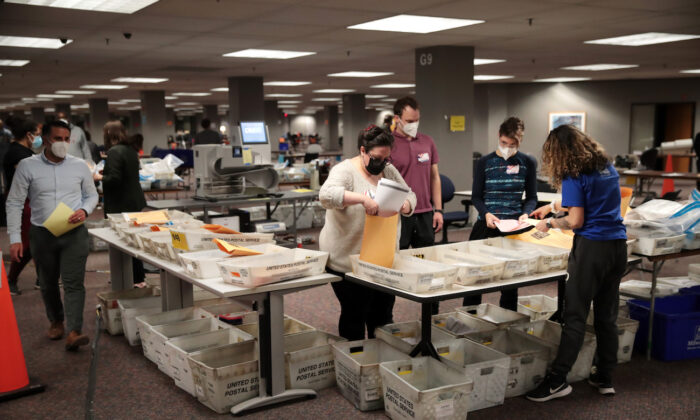‘We are the final arbiters of votes in the state of Wisconsin, and we need to know why those ballots weren’t included anywhere,’ the commission chair said.
Almost 200 absentee ballots were left uncounted in Madison, Wisconsin, after the 2024 general election, causing state election officials to launch an investigation on Jan. 2 to determine whether the city clerk broke state law.
The Wisconsin Elections Commission will investigate whether Madison City Clerk Maribeth Wetzel-Biehl flouted state laws or abused her discretion, after it voted unanimously to open a probe on Thursday. The commission is concerned that Wetzel-Biehl’s office did not notify it of the problem until the end of December, which is nearly a month and a half after the election and several weeks after Commission Chair Ann Jacobs certified the state election results on Nov. 29.
The clerk’s office defended Wetzel-Biehl’s actions in a statement, suggesting that the uncounted votes could not have affected the outcomes of any races or referendums on the 2024 ballots. Jacobs, however, described the actions as “so egregious” that the commission needs to understand what happened so they can be prevented before the 2025 spring elections.
“We are the final canvassers,” Jacobs said. “We are the final arbiters of votes in the state of Wisconsin, and we need to know why those ballots weren’t included anywhere.”
Wetzel-Biehl said in a statement to The Associated Press that her office looks forward to working with the commission and finding out what happened so that similar issues can be prevented ahead of future elections.
The Madison city clerk received scrutiny in September after her office announced it had accidentally sent out up to 2,000 duplicate absentee ballots, which Wetzel-Biehl blamed on a data processing issue.
The commission learned of the uncounted ballots on Dec. 18, when Wetzel-Biehl’s staff told the group they had tallied more received absentee ballots than those that had been previously counted in three city wards, according to election commission documents.
Wetzel-Biehl was required to issue a detailed statement to the commission, which they received on Dec. 20 in a memo. The memo described the clerk’s office discovering 67 unprocessed ballots for Ward 65 and one unprocessed ballot for Ward 68 in a courier bag found in a voter tabulating machine on Nov. 12. While reconciling ballots for Ward 56 on Dec. 3, the clerk’s office found another 125 unprocessed ballots in a sealed courier bag, according to the memo. Reconciliation is a process that must be completed by clerks 45 days after elections to account for every ballot created.
While the memo did not explain why the ballots were not counted, it said the clerk’s office planned “to debrief these incidents and implement better processes.” In a follow-up statement on Dec. 26, the clerk’s office said it had notified the elections commission and would issue apology letters to all affected voters.
Madison Mayor Satya Rhodes-Conway released a statement the same day indicating that the clerk’s office did not notify her staff of the ballots until Dec. 20 and that her office would review the city’s elections procedures.
“While the discovery of these unprocessed absentee ballots did not impact the results of any election or referendum, a discrepancy of this magnitude is unacceptable,” Rhodes-Conway wrote in the statement.
Wisconsin is one of the seven battleground states considered critical to winning the White House. Republican Donald Trump narrowly won the state in 2016 before losing it to Democrat Joe Biden in 2020. Trump then won Wisconsin again in 2024, beating Vice President Kamala Harris, a Democrat, by roughly 29,000 votes. Both Madison and surrounding Dane County are considered Democrat strongholds, and Harris won the county by 75 percent in November.
The Associated Press contributed to this report.

